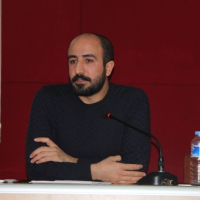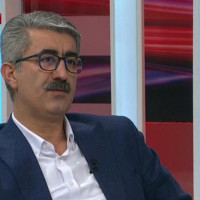Research Articles
Book Reviews
Issue Editorial Board






 0000-0001-7000-3686
0000-0001-7000-3686
Aim & Scope
AFRICANIA aims to contribute to disseminating scientific and current knowledge about the African continent. By featuring research that delves into Africa's social, cultural, economic, and political dynamics, the journal seeks to increase the production of knowledge related to Africa. It also places special emphasis on studies regarding the historical and contemporary relations between Turkey and Africa.
With a multilingual publication approach, AFRICANIA aims to reach a wide international audience with academic contributions related to Africa.
AFRICANIA covers a broad range of academic research in the social sciences concerning the African continent. The journal addresses various topics in this context, including Africa's history, culture, economy, politics, environmental issues, and education and healthcare systems. Studies on Turkey-Africa relations and academic works in this field are also part of AFRICANIA's scope. The journal aims to create a multidisciplinary and multilingual academic platform featuring contributions from domestic and international scholars researching Africa.
Author Guidelines
Manuscripts submitted for evaluation should be original and not previously presented or published in any electronic or print medium. If a manuscript was previously presented at a conference or meeting, authors should provide detailed information about the event, including the name, date, and location of the organization.
- İnönü University Journal of African Studies: AFRICANIA is an internationally peer-reviewed journal published twice yearly (January-July), except for special issues.
- Submitting a manuscript to İnönü University Journal of African Studies - AFRICANIA via the article submission system is considered as an application for publication. No submission fees are charged for the articles.
- The authors hold full legal responsibility for the content of the articles published in İnönü University Journal of African Studies: AFRICANIA.
- İnönü University Journal of African Studies: AFRICANIA reserves the right to make corrections, publish, or refuse to publish submitted articles.
- İnönü University Journal of African Studies: AFRICANIA will publish in multiple languages, including Turkish, English, French, Arabic, and Persian.
- The manuscript to be uploaded to the article submission system should begin with the language in which the article is written, followed by the title in English. Additionally, it must include at least a 200-word summary in the original language of the article, an English abstract, and a Turkish abstract. The manuscript should also contain 5-8 keywords.
- After the Abstract section of the submitted articles, there must be a "Structured Abstract" section, which should be at least 750 words long in English. The structured abstract should include your findings and, particularly, the conclusions from the results section, as they are, excluding the introduction part. A structured abstract in English must be included in English-language articles as well.
- The full text of the manuscript should not exceed 11,000 (10.000 for the articles in Turkish) words. Any images, figures, or maps included in the article should be submitted in high resolution and scanned at print quality. These visual materials should be sent as supplementary files and must adhere to the naming conventions for figures and tables. The total length of figures, tables, and images should not exceed 10 pages (one-third of the manuscript).
- Below the title of the manuscript, the author's name, title, country, the institution they are affiliated with, their email address, and ORCID information should be provided. After the initial evaluation process, if the article progresses positively through the editorial process, the author's data will be removed, and the peer review process will be initiated. If the peer review process results in a favorable outcome, the editor will re-add the relevant information to the article. Therefore, since the manuscript will be reviewed upon submission, including author information in the manuscript will not pose any issue.
- Manuscripts must be submitted via the following link: https://dergipark.org.tr/en/journal/3643/submission/step/manuscript/new and sent with a "Copyright and Authorship Agreement Form"
- The submitted manuscript must not have been previously published elsewhere. However, if this fact is explicitly stated, the publication of conference proceedings in book format as an article is possible.
- Manuscripts must be submitted in the format specified below. Manuscripts that do not follow this format will not be considered for review.
Paper Size: A4 Portrait
Top Margin: 2.5 cm
Bottom Margin: 2.5 cm
Left Margin: 3 cm
Right Margin: 2.5 cm
Font: Times New Roman
Font Style: Normal
Font Size (main text): 12 point
Abstract Font Size: 10 points, 1 line spacing
Font Size (footnotes): 9 point
Turkish Main Title and Spacing: 12 points, 1 line spacing, 12 nk
English Main Title and Spacing: 12 points, 1 line spacing, 12 nk
Table/Graphic Font Size: 10 point
Paragraph Indentation: 1.25 cm
Paragraph Spacing: Before 6 nk, After 6 nk (For tables and graphics: Before and After 0 nk)
Line Spacing: Single (1)
Page Layout
- Manuscripts should be written in Microsoft Word, and the page layout must be arranged as specified below:
- If a special font has been used in the manuscript, the font must be submitted along with the document.
- Details such as headers and footers should not be included in the manuscript.
- The title of the manuscript should be written in all uppercase letters, in 12-point font, bold, and centered. Subheadings and secondary headings should have only the first letter of each word capitalized, and the headings should align with the paragraph indentation.
- In terms of spelling and punctuation, unless dictated by the article or topic, the Turkish Language Association’s Spelling Guide guidelines should be followed. For articles written in other languages, the spelling rules of the respective language should be applied.
- The APA 7 citation system should be used for referencing. A complete list of references must be provided at the end of the manuscript.
- Direct quotations must be enclosed in quotation marks. Quotations of fewer than three lines should be included within the text; quotations over three lines should be indented 1.5 cm from both the left and right margins, in block format, with 1.5 line spacing, and set in 9-point font. Footnotes should be avoided as much as possible and only used for explanations. Automatic numbering (in Microsoft Word) should be applied.
- References cited in the bibliography should be listed alphabetically by the author’s surname and written in 12-point font. The hanging indent style should be applied to the reference list. (Hanging Indent: 1.25 cm, Before Spacing: 6, After Spacing: 6, Line Spacing: Single, Value: 12 nk)
Ethical Principles and Publication Policy
PUBLICATION ETHICS
AFRICANIA aims to adhere to the guidelines and core practices set forth by several organizations, including the Committee on Publication Ethics (COPE) guidelines and the Principles of Transparency and Best Practice in Scholarly Publishing (joint statement by COPE, DOAJ, OASPA, WAME). These guidelines and recommendations are designed to promote transparency, integrity, and best practices in scholarly publishing.
By adhering to these standards, the journal aims to ensure that the research it publishes is of high quality and meets the ethical standards of the scientific community.
ETHICAL PRINCIPLES AND PUBLICATION POLICY
Ethics Committee Approval and Informed Consent
All research involving human subjects must be reviewed and approved by an ethics committee (e.g., IRB) before being conducted. The name of the ethics committee, approval number, and date should be included in the Methods section of the manuscript. Authors may also be required to provide a copy of the approval.
If the study is exempt from ethics approval, authors must provide a statement from the ethics committee explaining the exemption. If a manuscript is submitted without ethics approval, the journal will follow COPE's guidelines to assess the ethical concerns. Manuscripts lacking approval may be rejected if the issue is deemed significant.
Informed consent details must be included in the Methods section, along with relevant information about the research process.
For studies involving human subjects, authors must confirm that written informed consent was obtained from all participants, and the consent form should be kept by the researchers. For research involving children under 18, consent must be obtained from the parent or guardian. In surveys or interviews, participants’ consent for data use must also be confirmed. Personal details should be de-identified unless explicit consent for naming is given.
Authors are responsible for protecting participant anonymity and confidentiality, especially in photographs. Signed releases must be obtained for any images, ensuring consent for publication and specifying any conditions. This approval must be noted in the Methods section.
PLAGIARISM AND ETHICAL MISCONDUCT
All submissions undergo multiple screenings during the peer review and/or production processes using similarity detection software. When citing previous works, ensure that all material is properly referenced. Copying text, tables, or illustrations from any source (journal articles, books, theses, electronic media, etc.) and presenting them as one's own is considered plagiarism, even if a reference is provided. Listing the source in the 'References' section does not absolve authors of responsibility for plagiarism.
Authors are strongly encouraged to avoid any form of plagiarism or ethical misconduct, as illustrated below:
- Citation Manipulation: Refers to inflating citation counts through self-citation, excessive citation of the same journal, or citation stacking, which distorts academic recognition.
- Self-Plagiarism (Text Recycling): Involves reusing sections or sentences from an author's prior work without proper citation, constituting a form of plagiarism.
- Salami Slicing: The unethical practice of publishing multiple articles using the same data set, hypotheses, and methods from a single study.
- Data Fabrication: The creation of false data not supported by actual research or experiments, considered a serious breach of research integrity.
- Data Manipulation/Falsification: Involves altering data, such as modifying images or removing outliers, to mislead or misrepresent findings.
In cases of suspected misconduct (e.g., plagiarism, citation manipulation, or data falsification), the Editorial Board will follow COPE guidelines to ensure fair, transparent, and consistent handling of allegations.
OPEN ACCESS POLICY
All articles published in the AFRICANIA are permanently accessible online at no cost, with no registration requirements. Authors retain the copyright to their work while permitting third parties to share, reproduce, and distribute the content in accordance with the journal’s Copyright and Ethics policy.
All published content will be licensed under the Creative Commons Attribution-NonCommercial 4.0 International License (CC BY-NC 4.0), which allows non-commercial use, distribution, and modification, provided proper credit is given to the original source.
All journal content can be accessed freely at https://dergipark.org.tr/en/pub/africania/archive.
COPYRIGHT POLICY
Author(s):
- The authors confirm that the work submitted to the journal is an original work prepared by the specified author(s) and that the work is free from plagiarism.
- All authors have individually contributed to the work and take full responsibility for it.
- All authors have seen and approved the final version of the submitted manuscript.
- The manuscript submitted to the journal has not been previously published on any platform, nor has it been submitted for publication elsewhere.
- The authors acknowledge and undertake that the manuscript text, including any figures, images, and documents used, does not infringe on the copyright of others.
By submitting their work to the journal under the CC BY-NC license, the authors are considered to have accepted the following conditions:
- The copyright of the published article remains with the author(s).
- By submitting the article to the journal, the authors grant the journal the right to publish the article and identify the journal as the original publisher.
- When authors cite others in the footnotes and references, they grant any third party the right to freely use the article.
- No provision of this license infringes on or limits a writer’s right to protect the integrity and ownership of their work.
- All commercial rights related to the article remain with the author(s).
The copyright of the works published in the Africania Journal belongs to the authors. These works are licensed under the Creative Commons Attribution-NonCommercial 4.0 International (CC BY-NC 4.0) License. The Creative Commons Attribution-NonCommercial 4.0 International (CC BY-NC 4.0) license allows the work to be shared, copied, reproduced, and adapted in any way other than for commercial purposes, provided proper attribution is given to the original work.
AFRICANIA requires that each submission to be accompanied by a "Copyright and Authorship Agreement Form"
PRICE POLICY
No fees are charged to authors or institutions for submission or publication. All journal expenses are covered by İnönü University, and there are no submission or publishing fees for accepted articles.
ADVERTISING POLICY
AFRICANIA accepts digital advertisements on its website, provided they are approved by the journal's Editorial Board and management. All advertisements must be clearly labeled as such. Advertisers have no influence on editorial decisions or advertising policies.
For advertising inquiries, please contact the Editorial Office (inueditorial@inonu.edu.tr).
PEER REVIEW DETAILS
AFRICANIA maintains a rigorous and transparent double-anonymized peer-review process to ensure the highest standards of academic integrity. Manuscripts are subjected to this process, where both authors and reviewers remain anonymous to one another.
Each manuscript is evaluated by at least two independent external reviewers who are experts in the relevant field. While authors may suggest potential reviewers, the final selection is made by the editor, who is not obliged to follow the author's recommendations. Confidentiality is paramount throughout the review process, and reviewers must keep the manuscript confidential, sharing it only with the editor's consent. Reviewers provide timely, unbiased, evidence-based, and constructive feedback to improve the quality of the manuscript. Any suspected research misconduct must be reported to the editor confidentially to uphold the process's integrity. The journal ensures transparency by publicly sharing information about the review process, selection criteria, and appeals procedure and publishing key metrics like acceptance rates and publication timelines. The final decision on whether a manuscript is accepted, revised, or rejected rests with the Editor-in-Chief, who considers recommendations from Field Editors. Reviewers must disclose any potential conflicts of interest before accepting an invitation to review, and all communications between editors and reviewers are confidential. External editors handle manuscripts submitted by editorial board members to ensure impartiality, and these external editors must also disclose any conflicts of interest. If the peer-review process deviates from standard procedures, the type of review will be indicated in the article to maintain transparency and accountability.
REVISION DETAILS
Manuscripts that require "minor revision" or "major revision" will receive a decision letter from the Editor-in-Chief, which includes the reviewers' and editors' comments, along with a deadline for resubmission. Authors must submit a revised manuscript and a detailed "Response to the Reviewers" document, which addresses each comment individually. The response should explain the revisions made and specify the corresponding line numbers in the manuscript. An annotated version of the manuscript highlighting the changes must also be provided. Revised manuscripts must be submitted within the deadline specified in the decision letter. Failure to meet the deadline may result in the rejection of the revision. If additional time is needed, authors should request an extension before the original deadline expires.
AUTHORSHIP CRITERIA
Authors of submissions reporting research findings must meet all four criteria established by the International Committee of Medical Journal Editors (ICMJE):
- Substantial contributions to the conception or design of the work or the acquisition, analysis, or interpretation of data for the work;
- Drafting the work or revising it critically for important intellectual content;
- Final approval of the version to be published;
- Agreement to be accountable for all aspects of the work, ensuring that questions related to the accuracy or integrity of any part are appropriately investigated and resolved.
Before submission, authors should determine who qualifies for authorship and in what order authors will be listed. The editors of the AFRICANIA do not resolve authorship disputes. Any changes to the number or order of authors after the initial submission must be explained in writing to the Editor-in-Chief. The editors reserve the right to refer any authorship irregularities to the research officer or appropriate academic ethics authority at the institution or employer of the first or corresponding author.
Authors may use CRediT (Contributor Roles Taxonomy) to provide information about individual contributions at the time of submission.
Declaration of Interests
Any potential financial or non-financial competing interests, including relationships with editorial associations, commercial editing companies, medical communications companies, or other organizations interested in the submission, must be disclosed at the end of the manuscript, just before the References section.
Funding Information
All sources of funding must be acknowledged at the end of the manuscript. Authors should specify the role of the study sponsor(s), if applicable, in the study design, data collection, analysis, interpretation, report writing, and the decision to submit the manuscript for publication. If the funding source had no involvement in these areas, the authors should clearly state this.
The Role of Artificial Intelligence (AI) in Manuscript Preparation
AFRICANIA follows the Committee on Publication Ethics (COPE) guidelines regarding the use of AI and AI-assisted technologies in manuscript preparation. Authorship entails responsibilities that only humans can fulfill, and authors are accountable for the originality and integrity of their work.
AI tools may be used for language editing; however, their use must be explicitly acknowledged in the manuscript. AI cannot be listed as an author, as authorship requires intellectual contributions, critical reasoning, and accountability—elements that AI cannot provide. Maintaining these standards is essential to preserving the quality and originality of published research.
POST-PUBLICATION CORRECTION REQUESTS AND RETRACTIONS POLICY
All post-publication correction requests are subject to editorial review. The Editorial Board evaluates the necessity and appropriateness of corrections based on the nature of the error, its impact on the article, and the supporting evidence. If approved, the correction will be made in the journal’s archive. The journal follows the COPE guidelines.
Article Withdrawal (Pre-Publication)
Withdrawal applies only to articles in press, which are early versions of articles that may contain errors, accidental duplicate submissions, or ethical violations (e.g., multiple submissions, fraudulent data, or plagiarism). Withdrawn articles will have their HTML and PDF content removed, replaced by a statement indicating the withdrawal and linking to the journal’s withdrawal policy.
Article Retraction (Post-Publication)
Retractions are issued for serious ethical violations, such as plagiarism, data fabrication, authorship fraud, or publication without co-author consent. Retraction notices include:
- A formal retraction note titled “Retraction: [Article Title],” published in a subsequent issue.
- A watermark on the PDF of the original article, marking it as "Retracted."
- A removal of the HTML version, ensuring transparency in corrections while preserving academic integrity.
Article Removal (Legal & Safety Concerns)
In rare cases, an article may need to be permanently removed from the journal’s online database due to legal issues, court orders, defamation, or significant health risks. While the metadata (title and authors) will be retained, the article content will be replaced with a legal notice explaining the removal.
Article Replacement
If an article poses a serious health risk, authors may request a replacement with a corrected version. In such cases, a retraction notice will be published with a link to the revised article, ensuring a transparent record of updates.
Self-Archiving Policy
Authors are permitted to self-archive their published work on institutional or personal websites, as well as in open-access repositories. When sharing their articles, they must appropriately cite the original publication and include the DOI number. Additionally, authors are encouraged to provide a link to the publisher’s official website, ensuring the authenticity and integrity of the scientific record. The version published on the publisher’s website is considered the definitive version of record.
DISCLAIMER
The views and opinions expressed in published manuscripts belong solely to the author(s) and do not necessarily reflect those of the editors, editorial board, or publisher. The editors, editorial board, and publisher are not responsible for the content of published manuscripts and do not endorse the views expressed within them.
Authors are fully responsible for the accuracy and integrity of their work. While the journal serves as a platform for disseminating research to the scientific community, it does not guarantee the validity of the content.
Price Policy
All expenses of Africania have been covered by the publisher. Publishing an article in the journal is free of charge.
No processing or submission fees are charged for submitted or accepted articles.

